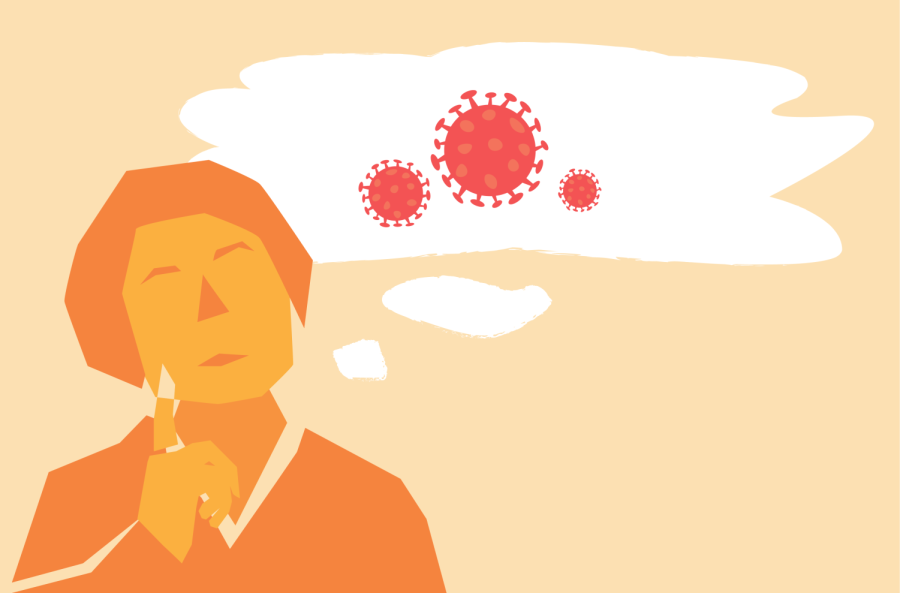In 2020, the COVID-19 pandemic transformed the world and changed daily life across the globe. When Washington state officially reported the first death in the United States, state residents were at the center of the pandemic that would go on to restrict lifestyles, withhold normalcy associated with direct contact and ultimately lead to the death of 1,172,229 people and the hospitalizations of millions in the United States. During the pandemic, masking and staying six feet away from patrons in public places became the new normal.
Nearly four years post-pandemic, the Centers for Disease Control and Prevention (CDC) has announced there are new COVID variants that have been discovered in the U.S. and globally.
We checked in with students on campus to get their thoughts and reactions to the news of the variants.
Zooey Redmond, a second-year history major, opened up about her feelings regarding life on campus after the pandemic and the realities of daily life. Redmond makes it a goal to incorporate social distancing into her daily routine but sometimes falls short.
“I probably feel the need to social distance, I have been inconsistent with masking cause I forget my mask or no one else is wearing a mask,” Redmond said.
To protect herself from the virus, Redmond makes it her goal to wear a mask and continue to social distance on campus to assuage her concerns related to COVID-19.
While Redmond makes the effort to take preventative measures against the virus, she feels that others on-campus, and the university as a whole, may not be doing the same.
“I have been hearing about a lot of people getting sick this quarter especially. I am not sure that they do a great job, but it’s at the bar of every other place,” Redmond said.
Redmond suggested that there may have been a rush to get things back to normal and the presence of COVID is not significantly acknowledged.
“My main complaint is that generally, society has kind of stopped acknowledging that COVID is a thing that affects people, and the university is maybe a bit lax about that,” Redmond said.
While the university encourages students and faculty to isolate for 5 to 10 days if one tests positive, it is no longer required to provide documentation of one’s COVID-19 vaccination status. Additionally, masks are only encouraged if one believes that they may have been exposed to COVID-19 or after an infection as opposed to wearing one when with the onset of symptoms.
Caroline Penner, a second-year biology major, shared how COVID personally affected her back in 2020.
“One of my parents is a physician in the [emergency department] and was personally involved with so many COVID cases. It was a very stressful time because of the lack of information on COVID-19 and it was scary having to worry about my parents being exposed constantly to new variants, especially during the shortage of N95 masks,” Penner said.
With it being the time of year that the spread of illness is heightened, Penner shared some things that she incorporates into her routine to avoid getting sick.
“I wash my hands before I eat and try to avoid people with symptoms of being sick, but otherwise not a lot. I’ve been told we humans generally have a good immune system, so I don’t get too worried about catching colds,” Penner said.
In regard to the announcement made by the CDC that addressed the new variants, Penner said that she did not find this news to be distressing.
“I have heard about it but am not very concerned. I feel like COVID is becoming a part of our lives and will continue to stay in it, like the flu. I hope no changes to our college life will happen since we have more knowledge and understanding about this virus,” Penner said.
Kai Schnitzius, a second-year international studies and political science major, also chooses to mask in his daily routine. Schnitzius, like Penner, was not too alarmed by news of the variants.
“I hadn’t heard about it until last week, but I haven’t heard much so I’m assuming it’s not something I should be majorly worried about,” Schnitzius said.
Schnitzius, similar to Redmond and Penner, encouraged their peers to take basic safety measures to prevent the spread of COVID across campus.
“I mask, frequently wash my hands, and try to maintain a balanced sleep schedule,” Schnitzius said.
Student perspectives vary on appropriate precautions in light of new disease variants. As the university attempts to strike a balance between safety and returning to normal campus life, opportunities for diverse voices to be heard are vital in determining the most effective response for our community.












